The Advocacy strategy –
The Immigrant Council of Ireland was tasked with coordination of the advocacy strategy. From the outset Turn off the Red Light was a pro-active campaign using every opportunity to engage with policy-makers and political representatives. The organisations’ political strategist had vast experience of the political system and strong relationships with Government and public representatives. In addition, the various members of the coalition had long standing relationships with political representatives, across the different parties. The campaign enjoyed good working relationships, resulting from members’ work, over many years representing diverse communities. The campaign constructed a critical path, simplifying the complexities of the issues. We communicated to politicians and others what we believed the problem to be, supported by evidence, with a clear ‘ask’, offering alternatives and solutions.
Political engagement was a crucial, core aspect of the campaign and involved intensive, regular engagement, with politicians on the issue as often as it could, both nationally and locally. The organisations spent alot of time in Leinster House, where the parliament is based, briefing Politian’s and responding to any queries individuals might have. Time was also allocated to engage with politicians locally through member organisations and local events/media liaison.
 The action page on the website (http://www.turnofftheredlight.ie/action/) directed supporters to their local political representative and the campaign encouraged traffic to this page through a range of activities, ensuring regular contact with political from our supporters. This ensured that the issue stayed on the political agenda.
The action page on the website (http://www.turnofftheredlight.ie/action/) directed supporters to their local political representative and the campaign encouraged traffic to this page through a range of activities, ensuring regular contact with political from our supporters. This ensured that the issue stayed on the political agenda.
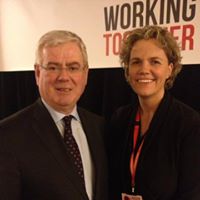
Former leader of the Labour Party, Eamon Gilmore with Chair of TORL, Denise Charlotn
The campaign was supported with stands at the Ard Fheiseanna or National Conferences of the four biggest parties as well as a near constant presence within Leinster House. Early support from the various parties was achieved through the successful passing of motions of support at their National Conferences by the members of Labour, Fianna Fáil and Sinn Féin. In addition, key allies were identified within Fine Gael and encouraged to grow support within that party.
A number of approaches and strategies were used:
Experts/champions – It is widely recognised, that change comes rarely from force of logical argument alone or from the presentation of irrefutable evidence in support of the changes required. Much depends on the character, approach and credibility of those seeking change and the receptiveness of those they are seeking to persuade. As the Oireachtas investigated the issues involved, the partners of T

Katie Mannion, ICI and Former Taoiseach Enda Kenny
urn off the Red Light offered every possible support both within and beyond the process. Expert witnesses were recommended from a number of jurisdictions. Briefing materials were provided and outside legal advice was offered on how to overcome some of the more complex areas. Members such as the Immigrant Council of Ireland, Ruhama and other frontline allies, including the crucial Irish Nurses and Midwives Organisation (INMO) on the union side, had in depth discussions with politicians through the complexities of what was involved.
Supporters and ‘champions’ representing all aspect of Irish Society, lent their voice to the campaign, and this was communicated actively to politicians nationally and locally.
In addition to engaging local, national and international experts, the campaign facilitate a visit to Sweden, by key agencies to interrogate the Swedish approach and its suitability in the Irish context. An further trip was organised by member of the Justice Committee, with key politicians, when considering and reviewing the legislation for the Irish Government.
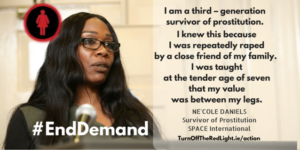 Survivor participation and witness – A key moment in boosting political support was a decision to bring the voices of survivors to the attention of politicians. A packed briefing galvanised support, most notably male politicians were swayed by the authentic voices of survivors. The survivors outlined the reality of the sex trade in Ireland, the impact on their lives and the difference they believe the proposed legislation would make.
Survivor participation and witness – A key moment in boosting political support was a decision to bring the voices of survivors to the attention of politicians. A packed briefing galvanised support, most notably male politicians were swayed by the authentic voices of survivors. The survivors outlined the reality of the sex trade in Ireland, the impact on their lives and the difference they believe the proposed legislation would make.
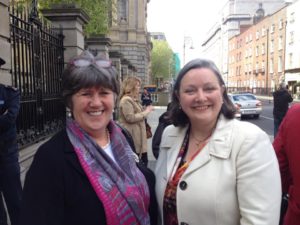
TD, Marcella Corcoran Kennedy and Former CEO of the DRCC Ellen O’Malley Dunlop
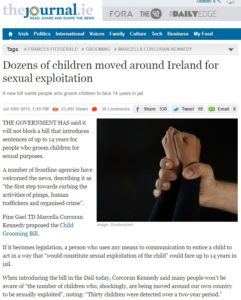
Media coverage of Child Grooming legislation
Presenting legislation on a specific provision:– the Immigrant Council of Ireland, Ruhama, the Dublin Rape Crisis Centre and Barnardo’s decided to advance some less controversial recommendations from the Justice Committee by way of Private Members’ legislation with Marcella Corcoran Kennedy, TD. The bill focussed on the crime of child grooming; it achieved extensive media coverage and re-engaged politicians, with Sinn Féin and Fianna Fáil using the opportunity to fully commit to overall laws with the Government.
Support of a robust media strategy – Political engagement was supported by a robust media campaign engaged across all possible platforms in terms of broadcast and print media and which, extensively used social media, with its own Facebook and Twitter accounts .In order to maintain momentum during the following summer and to hit the ground running when the Dáil resumed, the Immigrant Council of Ireland used its internal communications resources to place op-eds on prostitution in provincial newspapers across Ireland. The focus was links to organised crime together with the front-line experience of organisations within the campaign.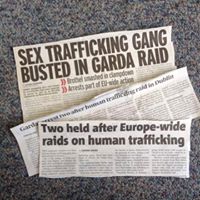 Through a systematic approach every county was covered, with the articles often followed up by local radio interviews. These served a number of purposes: to increase public awareness and drive people to the action page on the website, to bring it to the attention of politicians in their constituencies and to attract new regional partners. As the Dáil resumption drew closer this regional coverage was supplemented by at least one national press release a week – targeted primarily at getting on the Network News Bulletins aired on local radio and also the national newspapers. Almost without exception every press release landed on target – with the topics varying from the coalition growing, to international moves towards sex buyer laws in other jurisdictions, new data from the Immigrant Council or Ruhama or any new research in the area.
Through a systematic approach every county was covered, with the articles often followed up by local radio interviews. These served a number of purposes: to increase public awareness and drive people to the action page on the website, to bring it to the attention of politicians in their constituencies and to attract new regional partners. As the Dáil resumption drew closer this regional coverage was supplemented by at least one national press release a week – targeted primarily at getting on the Network News Bulletins aired on local radio and also the national newspapers. Almost without exception every press release landed on target – with the topics varying from the coalition growing, to international moves towards sex buyer laws in other jurisdictions, new data from the Immigrant Council or Ruhama or any new research in the area.